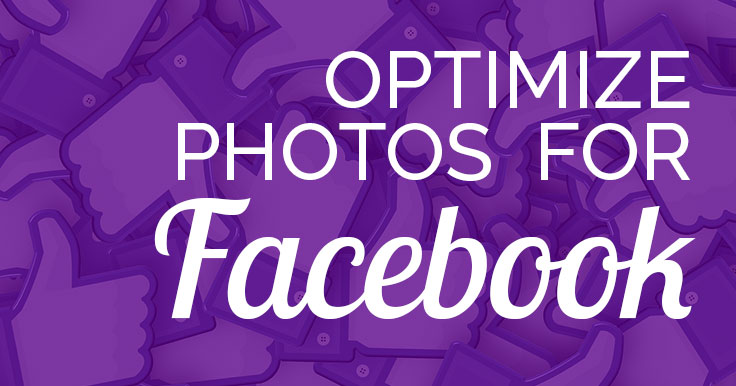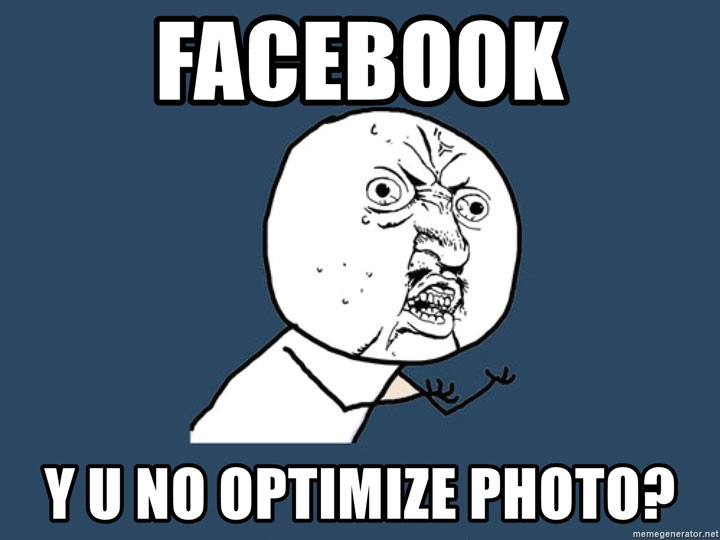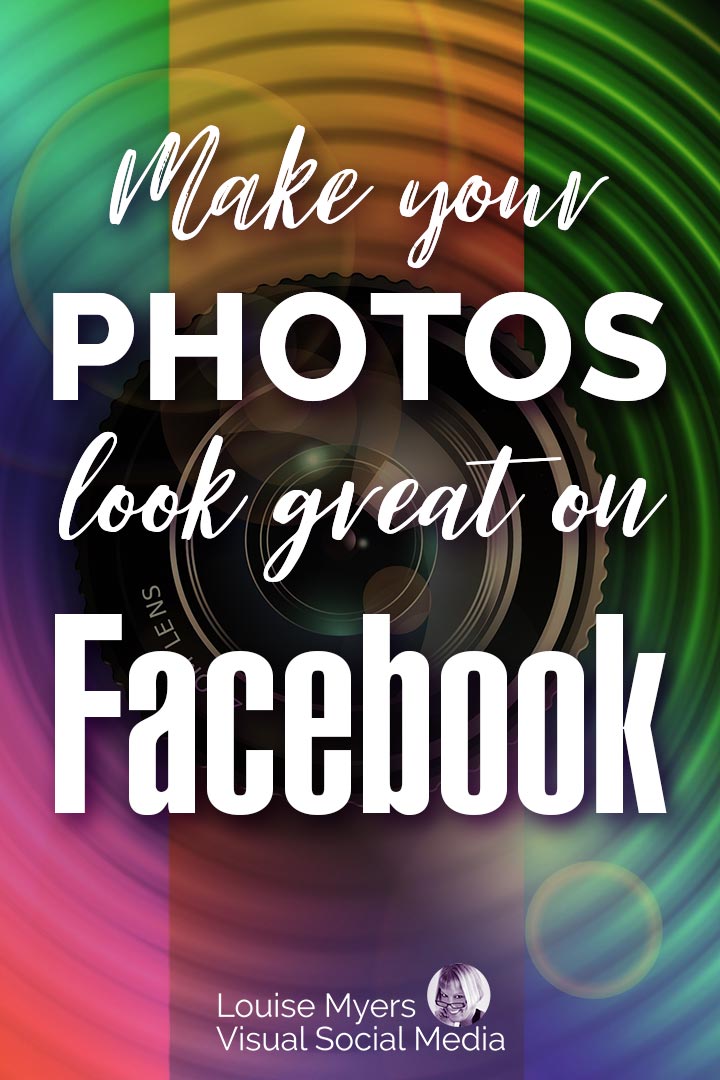Get Likes On Facebook Photos
You are here: Home / Facebook Tips / How to Optimize Photos for Facebook to Look Their Best

Want to learn how to optimize photos for Facebook?
Are you getting fuzzy text or choppy gradients in your Facebook images?
Here's the scoop on the photo file types and compression to use when uploading photos to your Facebook Page.
Use these tips to get clear photos and sharp text on Facebook images!
Why does Facebook ruin image quality?
It's all about Facebook image compression.
Facebook hosts an incredible number of photos: over 250 billion. And users upload over 350 million (350,000,000) new photos every day! source
Facebook generates 4 new petabytes of data per day.
Friends, that's a lot of bandwidth!
There's simply no option – Facebook will compress images.
Here's how to keep yours from looking like crud.

How to optimize Facebook post images
Your first step is to make sure you're using the best size for Facebook photos.
There are probably 100 different Facebook photo sizes! This section will go into detail on the Facebook post size. More photo types and sizes farther down in the article.
For optimal display, Facebook recommends that you resize your images before uploading to one of these widths they support:
- 720 px
- 960 px
- 2048 px
If you upload 2048 px photos, be sure to choose the High Quality option.
For higher quality, check the High Quality box when you create an album.
If you're using the the Facebook app for iPhone or Android, you can choose to always upload photos in HD from your account settings. source
For best quality, I recommend uploading from a computer. I've found that uploading from a mobile device results in more compression applied and worse image quality.
The Facebook recommended image size for posts is 720, 960, or 2048 pixels. Facebook says:
We automatically resize and format your photos when you upload them to Facebook. To help make sure your photos appear in the highest possible quality, try these tips:
Resize your photo to one of the following supported sizes: 720px, 960px or 2048px wide source
Note that Photos you've uploaded will appear in the Photo Viewer, or lightbox, at the maximum resolution possible, depending on the size you uploaded them and the viewer's display device.
The maximum Facebook photo size for upload and download is 2048 px square. If you upload a larger image, Facebook will reduce it so the longest side is 2048 px.
Now, I never take anything Facebook says about images at face value, so let's dig a little deeper.
What if you don't upload an image at Facebook recommended size?
Say you use another highly recommended image size of 1200 pixels wide.
According to Facebook, they will resize your image from 1200 pixels down to 960 to fit their standard settings, adding to your compression woes.
However, this is actually NOT TRUE!
Any image uploaded at less than 2048 pixels on the longest size will NOT be reduced in size.
So don't drive yourself crazy resizing images. Reduce large ones to 2048 max and you're good to go.
Facebook high resolution photo warning
Remember that photos can be downloaded at the full size you've uploaded, up to 2048 px.
Facebook photos can be downloaded by anyone you've allowed to view them in your permissions (and Fan Page posts are always public).
Any images might be downloaded and reused, even though that would be copyright infringement (unless you give permission). How to Report Claims of Intellectual Property Infringement.
You've also allowed Facebook to distribute your images according to their Terms of Service:
For content that is covered by intellectual property rights, like photos and videos (IP content), you specifically give us the following permission, subject to your privacy and application settings: you grant us a non-exclusive, transferable, sub-licensable, royalty-free, worldwide license to use any IP content that you post on or in connection with Facebook (IP License). This IP License ends when you delete your IP content or your account unless your content has been shared with others, and they have not deleted it.
I recommend you NOT upload your professional images at high resolution unless you have a specific reason to do so (for example, you want fans to download printable images of an event).
Also note that, even though Facebook won't resize images at the 2048 size, they will be resized in the user's browser. Very few people have a monitor or device that can display an image that large.
So 960 may be a better size for photographers to use.
I also suggest you watermark your images.
Facebook file formats
Facebook accepts uploads of .jpg, .gif, and .png file types.
JPG is generally used for images with blended tones, like photos, and GIF and PNG are better for images of flat tones, like logos, text, and graphics.
Facebook recommends: Save your image as a JPEG with an sRGB color profile.
If you choose to go with JPG, save photos for Facebook as sRGB JPGs at the least compression, or maximum file size.
Facebook will apply another round of compression to your photos, so saving them as large files assures best results. Facebook's compression will be more than adequate to assure fast-loading photos on the web.
In Photoshop, choose 12 – Maximum Quality.
Check Baseline Optimized.
Other than Facebook's full photo custom tabs (which are limited to 400kb), I haven't run into any file size restrictions. I uploaded a profile picture as a 2200px square, 3.1 MB file, and it worked fine.
Below is a brilliant tutorial on how to avoid ugly artifacts when saving JPG files for Facebook.
How to Get Sharp Text on Facebook Images
But what about those tough images with text or logos – should you save them as JPGs?
It used to be that Facebook compressed ALL images you upload to JPGs. Now there's a workaround for those fuzzy text graphics, like quote pictures or tips graphics.
Save them as PNG files!
It appears that Facebook maintains the PNG format when you upload one. PNG images I've uploaded look virtually the same on Facebook as on my computer monitor, with the same, or even larger, file size.
If you use advanced photo editing software like Photoshop, you know there are different kinds of PNG files.
PNG8 is perfect for flat expanses of color with text, like the image shown below. PNG8 only supports a maximum of 256 colors, so it's not suitable for photos, or graphics with gradient tones or glow effects.
PNG24: If you have a photo with text or a logo that's coming out fuzzy or with artifacts, try saving it as a PNG24. This format can have up to 16 million colors.
Use PNG24 only as needed, as the file sizes can be large, causing slower load times on slow internet connections.
Color note: Red tones are notorious for looking horrible on Facebook. Bright red, magenta, or red-purple are not good choices for Facebook images.
GIF: There's no reason to save as a GIF file for Facebook, but if you have one you want to use, Facebook will accept GIFs. PNG is a better choice when saving new images, as PNGs have better color and compression than GIFs.
Unfortunately, you can't upload animated GIFs from your computer or device to Facebook.
Should you sharpen photos for Facebook?
I'm not a photographer, I only play one on Instagram 🙂 So I'll leave this for you to test and decide.
Below is a great tutorial about sharpening photos for Facebook, from a pro photographer.
How to optimize Facebook Cover Photos
There are at least 3 aspects to optimizing Cover Photos:
- Correct size and shape for specific use (Page, profile, group or event).
- Different cropping of Cover Photos on desktop vs. mobile.
- File type and size.
Cover Photos are unique among Facebook images in that they won't be compressed further IF your uploaded file size is 100kb or less.
If you want to put Facebook to the test on that, use the minimum required pixel size and compress it yourself to 100kb or less. The image quality may be better if you do the compression, rather than Facebook.
However, it is not true that a larger file size will be compressed by Facebook to less that 100kb. I uploaded a hi-rez PNG and it's 1.1MB on Facebook – slightly larger even than the original file I uploaded.
Take a look at the Facebook file formats section above, as it also applies to Cover Photos!
As far as sizes, cover images larger than 2048 pixels on the longest side will be reduced to that dimension. No need to go larger than 2048 anyway.
Use just the right cover image size to look perfect on both desktop and mobile! Don't miss these constantly updated cover photo templates for:
Facebook Page Cover Photo size
Facebook Group Cover Photo size
Facebook Event Cover Photo size
Facebook Personal Profile Cover Photo size
How to optimize Facebook link previews
Facebook link thumbnails, or preview images, are pulled from the web page they link to. So it's likely you're starting with an image you've compressed to load quickly on your site.
You do, however, want to ensure your image is of the proper size to get a large preview image.
If your blog post image isn't big enough, then it will render as 154 x 154 or 90 x 90 px.
Facebook says:
Use images that are at least 1200 x 630 pixels for the best display on high resolution devices. At the minimum, you should use images that are 600 x 315 pixels to display link page posts with larger images. If your image is smaller than 600 x 315 px, it will still display in the link page post, but the size will be much smaller.
You can find all the details on the article below.
How to optimize Facebook profile pictures
Your profile picture will appear on Facebook at 160 pixels square, but the minimum size for uploading is 180 pixels square.
I suggest you crop your photo to a square, then size it down to 360 pixels square (double the minimum size) and save at the highest file size JPG.
Want more tips on profile pictures?
How to optimize Facebook photos: Conclusion
We've covered the top Facebook photo types here:
- Facebook wall posts
- Facebook Cover Photos
- Facebook link previews
- Facebook profile pictures
And I've linked to in-depth info for many!
There are so many more kinds of Facebook photos! Need more? I cover allll the Facebook sizes!
Review the info above, and in the linked articles.
Still have questions? Ask in a comment!
Pin it to help others withhow to optimize photos for Facebook!

Get Likes On Facebook Photos
Source: https://louisem.com/1730/how-to-optimize-photos-for-facebook
Posted by: ellisreem1944.blogspot.com

0 Response to "Get Likes On Facebook Photos"
Post a Comment